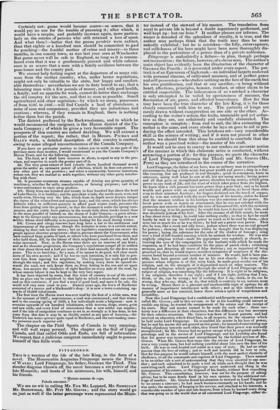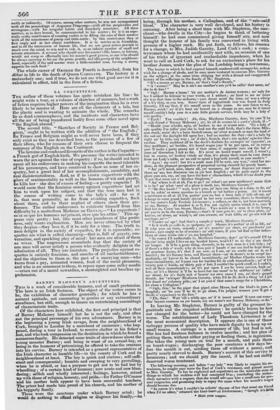FI TZ GEORGE.
Tam is a version of the life of the late King, in the form of a novel. The Honourable Augustus Fitzgeorge means the Prince of WALES; Lord Fitzgeorge, his father, GEORGE the Third. This slender disguise thrown off, the novel becomes a vie privee of the late Monarch; and treats of his mistresses, his wife, himself, and his friends.
" Mutato nomine de rege, Fabula narratui."
We see no wit in calling Mr. Fox Mr. Leppard, Mr. SHERIDAN Mr. Borrownian, Mr. Priv Mr. Graves ; and the story would go on just as well if the latter personage were represented the Minis- royal to private life is beyond a doubt ingeniously performed, and well kept up : but cui bone It neither pleases nor informs. The sinner is denuded of the splendour of royalty, it is true, and the author may perhaps think that the truth may thus be more nakedly exhibited ; but he is mistaken—the folly, extravagance, and selfishness of his hero might have been more thoroughly dis- played in the portraiture of a prince than of a private nobleman. But game never will be safe in England, as long as it is remem- Fitzgeorge is undoubtedly a failure—in plan, though perhaps bered even that it was a gentlemanly pursuit, and while subsist- not in execution; the failure, however, of a clever man. The author's ence is so scarce that a man with a family oscillates between the main object has evidently been the illustration of the character of poor-house and the county gaol. GEORGE the Fourth: it is presented under every aspect. The por- We cannot help feeling regret at the departure of so many cid- trait is of an Epicurean of high rank—an individual largely endowed zens from the mother country, who, under better regulations, with personal charms, of cultivated manners, and of perfect grace might not only be valuable to the state, but happy and comfort- and self-possession—who studies nothing on the face of the earth but able themselves : nevertheless we are in duty bound to say, that a his own gratification, and that at any sacrifice,—a being without labouring man with a few pounds of money, and with good health, heart, affections, principles, honour, conduct, or other claim to be a family, and an appetite for work, cannot do better than exchange , entitled respectable. The hideousness of so wretched a character the old country for the new, and that as soon as possible. Small is only attempted to be veiled by speciousness of manner, the agricultural and other capitalists—by which we mean, possessors fascination of air, grace, and affected benevolence. How far this of from 2501. to 5001.—will find Canada a land of abundance, a may have been the true character of the late King, it is for those mine of ease and competency, provided they are industrious and closely connected with him to say. The portraits of kings are cautious ; whereas, if they remain in England, there is nothing before them but the parish. Certainly not: game would become scarce—so scarce, that it ter instead of the steward of his master. The translation from rarely drawn without exaggeration on one side or the other. Ac- cording to the writer's notion, the traits, unamiable and yet seduc- tive as they are, are sedulously and carefully elaborated. The conception is complete : from end to end, the idea animating the author is the same, and every stroke he lays on goes to aid in pro- ducing the effect intended. This betokens art—very considerable skill ea the science of writing; and if it were not proved in other points, we should from this alone be enabled to conclude that the author was a practised writer—the master of his craft. It would not be easy to convey to our readers an accurate notion of the manner in which this elaborate satire is conducted, without extracting a portion of it: for this purpose, we quote the character of Lord Fitzgeorge (GEORGE the Third) and Mr. Graves (Mr.. Pen) as they are introduced in the course of the narrative.
Lord Fitzgeorge, the father of our hero, was an ordinary man in extraordinary circumstances, having a little mind, but great wealth and power ; deep in a fox- like cunning, but not profound in real thought ; quick in conception, hasty in utterance, seeing well what he saw at all, but not seeing much ; loving power and all that gave or strengthened power, therefore loving money, which gives power to any rank of :life, and the want of which takes power from the highest. He knew that a rich peasant has more power than a poor lord; and as he loved wealth and power with an equal and undivided affection, he loved them alike even to their minutest fractions ; his fingers disdained not the touch of copper, and he was not satisfied with the mere homage of his tenants, unless he knew that the meanest scullion in his kitchen was also conscious of his power. He loved power with so hearty an attachment, that be u-as not satisfied with the possession and exercise of it during the time of his natural life, with the certainty of transferring it to his posterity; he would fain have it buried with him, and was absolutely jealous of his heir. After the manner of all little minds, he made a fuss about every thing; he could take nothing coolly; so that in fact he could hardly be said to use wealth and power so much as to be used by them,—they were not so much his as he was theirs ; be bad not a power over power. Thus also he was, like a weak and silly lover, jealous where there was no real ground for jealousy ; showing his wea.kuess where he thought that lie was displaying. his power ; losing the substance for the sake of the shadow of homage; using ever a kind of left-handed cunning which he mistook for wisdom. Ile was also mightily religious withal—made his appearance very regularly at church, at- tracting the eyes of the congregation by the loudness with which he made the- responses, as if he had been candidate for the place of parish clerk ; criticizing sermons, and detecting all traces of false doctrine ; yet so impatient of being. preached to, that he would express manifest symptoms of weariness if the dis- course lasted beyond a certain number of minutes. He would, had it been pos- sible, have been parson and clerk too in his own church. Like many other persons whose religion is of this noisy kind, he made great secular use of his- religion, and on the strength of it dogmatized much on other matters. The undefined syllogism which passed through the mind of Lord Fitzgeorge on the subject of religion, was something like the following : It is right to be religious, I am religious, therefore I am right ; and if I am right, nothing that I say, think, or do, can be wrong ; but if nothing that I say, think, or do, can be wrong, they who say, think, or do, that which is contrary to my notions must. he wrong. Hence there is a pleasant and inexhaustible topic of apology for all, manner of impertinent interference with others ; and as this interference is- generally more or less resented, hence there arises a spirit of waspishness and Now this Lord Fitzgeorge had a confidential and favourite servant, or steward, called Mr. Graves ; and to this servant, so far as his Lordship could intrust or conAtle any thing, he trusted the management of his estates and the receipt of his rents. Man and master seemed to be made for each other : there cer- tainly was a difference in their characters, but this difference was but necessary for their relative situations. Mr. Graves was born of honest parents, and had received an education which fitted him, in all respects, for the situation which he held under Lord Fitzgeorge. He resembled his master in his love of power, but he and his master did not quarrel-on this point ; for instead ofentertaining any feeling ofjealousy towards each other, they found that their power was mutually strengthened ; for Mr. Graves had no power except what he acquired under the- patronage and in the service of Lord Fitzgeorge, and his Lordship also found that his power was increased and strengthened by the faithful services of Mr. Graves. When Mr. Graves first came into the service of Lord Fitzgeorge, he was a very young man, but had nothing youthful about him save the date of his. birth. He was as cool-headed and sedate as a man of sixty. He had no other passion than the love of ruling ; and so well and heartily did he love to rule, that for this purpose he would submit himself, with the most perfect elasticity of obedience, to all the commands and caprices of Lord Fitzgeorge. There seemed to be on either side a sort of understanding that they were essential to one ano- ther ; and each submitted to be made a tool of, while each thought that he was outwitting each other. Lord Fitzgeorge never undertook any thing in the management of his estates, or the disposal of his family, without first consulting Mr. Graves. This consultation, however, was not for the purpose of asking advice, but to be more firmly fixed in his own opinion, by the additional suf- frage of another. Mr. Graves found his situation as steward to Lord Fit/verge by no means a sinecure ; he had much business constantly on his hands, and he was under the necessity of keeping in his service, and 'attached to his interests, a considerable number ot spies and tale-bearers, from whom he learned every thing that was going on in the world that at all concerned Lord Fitzgeorge, either di- rectly or indirectly. Of course, among other matters, he was not unacquaioted with all the proceedings of Augustus-Fitzgeorge—with all his perplexities and etratagems—with his irregular habits and disorderly associates. All these matters, as in duty bound, he communicated to his master ; for it is an espe- cially crafty contrivance of cunning varlets to be filling the ears of their masters with all the minuteness of gossip and tittle-tattle : by this contrivance they at first imply and at last obtain confidence. It is in service as in friendship, and in all the intercourse of human life, that no one great action prevails so much over the mind, to win and to rule it, as an infinite number of small and minute attentions. A servant who should save his master's life, house, or fortune, would not creep so effectually into his master's good graces, as one who should be always carrying to his ear the prate, prattle, and idle gossip of the neighbour- hood, especially if the said master were a little-minded man, having a strong appetite for such food."
The whole career of GEORGE the Fourth is described, from his tUbut in life to the death of Queen CAROLINE. The history is a 'melancholy one; and if true, we do not see what good service it is -calculated to effect, told in the form of a fiction.




























 Previous page
Previous page